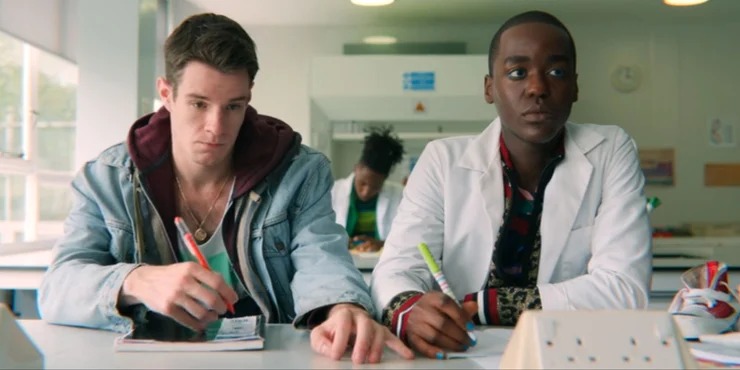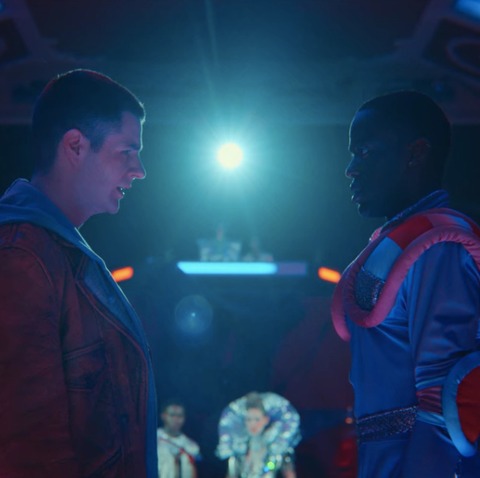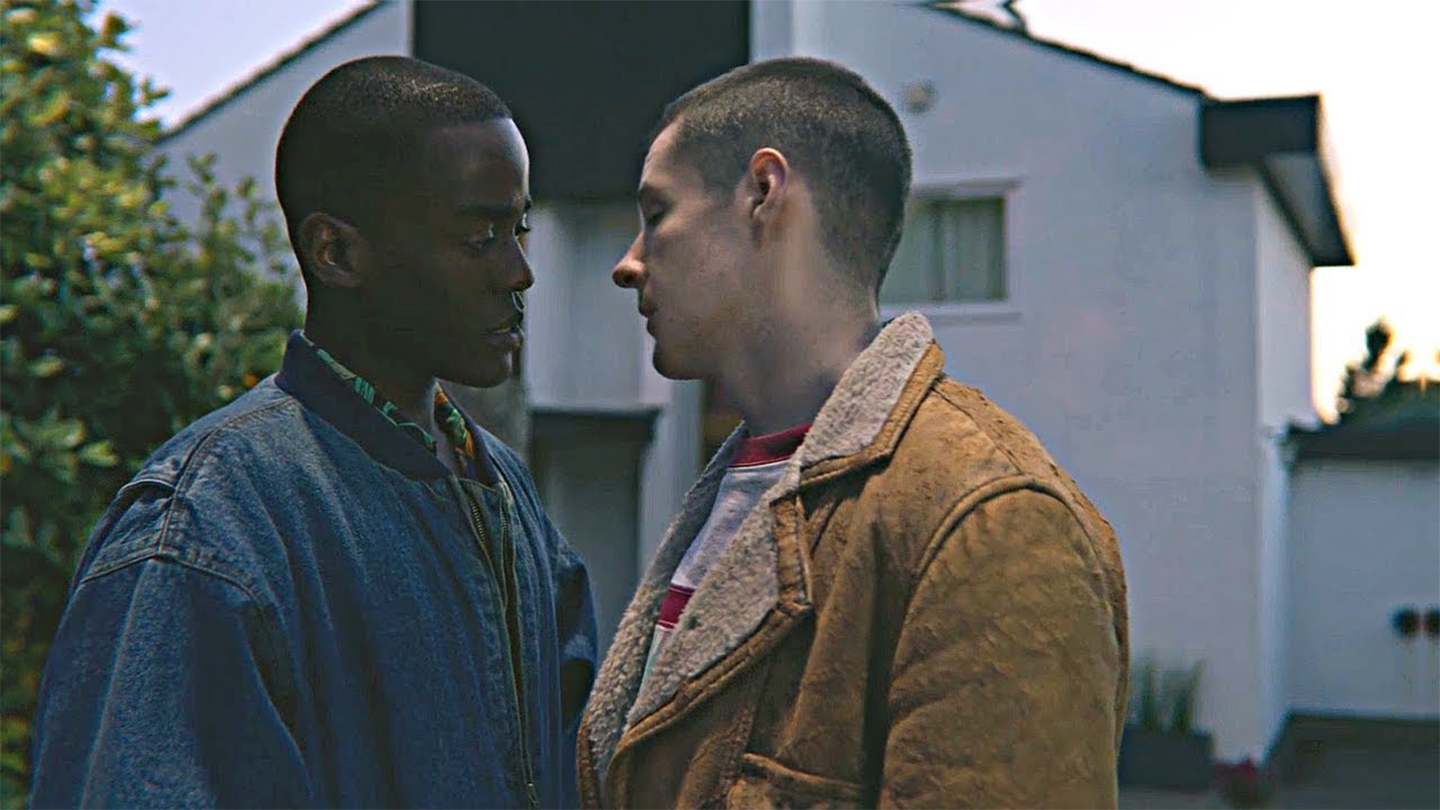No subject appears to be too taboo for Sex Education. In its new sophomore season, the brash Netflix teen drama continued to dive into as many topical issues as it can think of, jolting from an STI outbreak to asexuality and a nuanced exploration of sexual assault. For the most part, it treats these issues with sensitivity and respect, striving to represent a truly diverse range of characters while educating its young audience. Yet what continues to be a frustrating blind spot for the show is the blossoming relationship between Adam (Connor Swindells) and the former victim of his bullying, Eric (Ncuti Gatwa).
Sex Education is the latest in a growing queue of teen dramas that have used the trope of the ‘closeted bully’ as a handy way of generating a shock reveal whilst adding complexity to their antagonists when their secret homosexuality is finally revealed. In the show’s pilot Adam is the archetypal high school bully — he threatens Eric, calls him homophobic slurs, coined his belittling ‘Tromboner’ nickname, and literally steals his lunch. Simultaneously we see that Adam’s life is becoming increasingly emotionally fraught. He struggles to connect with his stern father and is repeatedly rejected by his ex-girlfriend, but through it all Eric remains the primary target of his ire, for seemingly no other reason than his being openly and flamboyantly gay.
Adam’s invasive style of bullying set off alarm bells from the beginning, but what surely many viewers were hoping would be reserved for smutty fanfiction, ultimately played out. When Eric finally stood up to Adam at the end of Season 2, a fight during detention led to a kiss and then oral sex. Adam immediately reacted with homophobic aggression, clearly struggling to process his confusion over his own sexuality and a growing attraction to Eric. Despite this toxic situation and their violent history, Eric reciprocates an attraction to Adam, and in the second season — out now on Netflix — their romance continues to develop.

Believing homophobia is an ideology sourced from sexual desire and repressed homosexuality is an oddly popular attitude, often used as a way of mocking homophobic figures — just look at the millions of jokes about Trump secretly being in love with Putin. Of course, this may be the motivation behind the actions of a few bullies of queer kids in school, but it’s dangerous to not consider that it’s predominantly a form of hate that simply comes from generational prejudice, religious teachings and plain cruelty. The most recent Stonewall School Report found in their research that almost half of LGBT+ schoolkids still experience homophobic bullying, while 52% still frequently hear the homophobic slurs that Adam often subjected Eric to.
As a result, this uncomfortable dichotomy between the earlier bully-victim status quo and a romantic relationship between Adam and Eric becomes a jarring elephant in the room for the show. While Adam spends much of the new season in a place of deep shame and fear of his queer identity, the show fails to have him truly reckon with how he treated Eric. Their scenes together at first seem to come from a different universe entirely — Adam beckons Eric to his window by throwing pebbles at it and they spend nights bonding in a junk yard, where the camera plays close attention to their touching as Adam adjusts Eric’s bat stance, Ghost style, so he can safely let off some steam and smash stuff. They even share a kiss as the sun rises behind them, whilst delicate string instruments underscore the moment to make it as romantic as possible.
Eventually their past is addressed in-show, when protagonist and usual voice of authority, Otis (Asa Butterfield) points out their prior history, albeit briefly. Otis also calls into question why Adam’s still too ashamed to be open with his feelings in broad daylight. Adam’s fear is also paralleled by new character, Rahim (Sami Outalbali), a confident, openly gay French transfer student, who is plainly interested in and unashamed to be with Eric. Although Otis quickly backs down from his line of questioning, it strikes a chord with Eric, who eventually expresses to Adam his unwillingness to be with him in this state of shame. However, instead of fully dealing with this process of self-acceptance, as well as the societal pressures and expectations that made him into a hostile loner figure, the show boils Adam’s journey down to the single cliched gesture of being able to hold Eric’s hand.

In getting him to make this one move, Sex Education unleashes a smorgasbord of rom-com tropes, even actively undermining Rahim’s character in order to make Adam a more viable boyfriend for Eric. In doing so, the show barely scratches the surface of what brings Adam to finally accept his bisexuality and move past his self-loathing. Instead, he opts for the grand gesture, physically running to the school and interrupting a wedding in the school play in order to ask Eric to hold his hand in front of the entire school. And just like that, a hand hold is all it takes to resolve Adam’s deep-rooted fear and his prior bullying. He’s fully absolved without even an apology.
While the sequence is clearly somewhat tongue-in-cheek, Adam and Eric’s entire relationship plays into Sex Education’s insistence on trying to marry its serious issues with its anachronistic 80s high school movie aesthetics, often refusing to place them in a recognisable reality. By presenting Adam and Eric as kindred hearts in an idealised love story, the series fails to engage with both the impact of homophobic abuse and the systemic prejudice that can generate deep internal homophobia in LGBT+ people.
In reality, a homophobic bully is unlikely to eventually proclaim their love for their victim; their violence probably not out of fear of their own latent sexuality. To present a relationship as such to a teenage audience is a dangerous fantasy that goes against the titular sex education the show seeks to provide. It’s time that the ‘closeted bully’ myth is put to rest.


